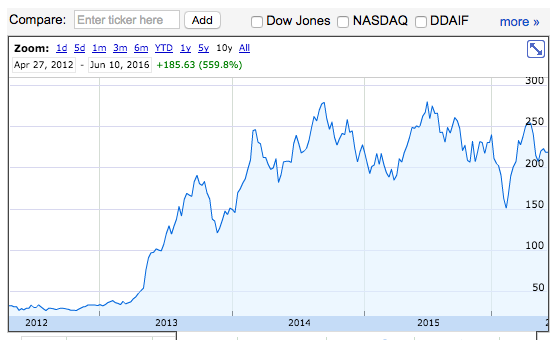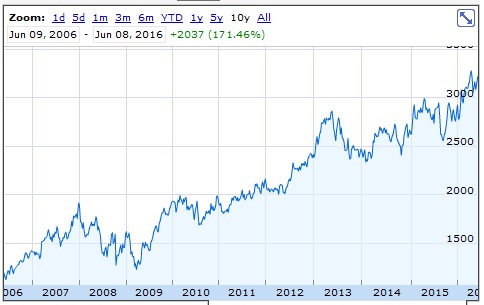I’ve been working in Finance for about 15 years. As a result I’m often asked by friends or family members for advice or tips about where they should put their money. I thought what better way to help our readers than to share some of this insider knowledge so we can all get richer together!
Nobody Has a Clue
Most people who work in Finance have no real investment advantage over you. In fact most of them don’t have a clue how to keep hold of their money let alone invest it successfully to grow their wealth. Given this truth most shouldn’t be trusted to manage anyone else’s. I work amongst what some might call the ‘elite’ of financial talent but i certainly wouldn’t trust any of them with my own investment funds.
Most of the money made in investment banks these days is via ‘the spread’. When you log onto your online broker you’ll be quoted two prices…a bid and an offer depending on if you want to buy or sell a particular investment. This spread is the ‘fee’ the broker will make from offering you the chance to either buy or sell. The more times financial institutions can get you to cross the bid/offer spread the more money they make and the more you lose. Their interests are usually not common to yours.
Sophisticated trading floors, fund and wealth manager do not have crystal balls. They have no way of knowing whether oil will rise or the USD fall. Sure they monitor all available news and make educated guesses but they honestly have no more of a clue than you or me.
They make most of their money by charging you the customer a fee on every transaction you make. Save yourself some money and trade less.
Know Your Risk
One of the most common reasons I see big losses being made in the office is because the risk taker (in my work usually a trading desk) wasn’t fully aware of the risks they were running. In my workplace this is usually some obscure second order risk mathematical risk (credit/fx/interest rate cross gamma, vega convexity etc) related to the limitations of the derivative pricing model being used.
Thankfully us private investors need not worry about such complexities. However we still need to be fully aware of the risks we are running. Sometimes its all to easy not to see the wood for the trees.
The price you pay for a share is no reliable indication of the long term value that will be realised. Buy any security and you are running the risk that the market will re-price it lower than what you paid. Understanding this and being able to understand the level of risk this adds to your portfolio is key to maximising your investment returns.
By investing in securities where this risk of repricing is low moves the odds of financial success significantly in your favour.
Stress Test Your Portfolio
I’ve discussed before about the importance of preserving your capital is something that a private investor should not ignore. No matter what investment strategy you adopt you’re guaranteed to be taking on some form of risk. As an investor it is crucial you are aware of and comfortable with the levels of risk you are taking.
At work we attempt to gain a better understanding of the risks being run by creating stress tests or ‘what if’ scenarios. You don’t need a complicated analytical model that requires daily calibrations of market data inputs to be able to do this. Sit down and ask yourself some of these type of questions:
- How much would I lose if the market fell X?
- What would need to happen for me to lose X?
- Could I cope if I lost 50% of my portfolio value?
- If prices fell 50% would I be a buyer?
- What % loss would need to occur before I called it a day and sold out of my investments for good?
It sounds simple but asking yourself these types of questions will help you get a better understanding of risks you are currently running. Perhaps even more importantly the answers should tell you if the level of risk being run matches your appetite should markets turn against you.
Regulation is a sh$t
It’s probably not news to any of you to hear that over the last few years the financial industry has become a sea of regulation. By intent this of course is a good thing however from a practical perspective, regulation almost always has huge unintended consequences. Heavily regulated industries (such as finance) are constantly having to evolve as the regulatory environment changes and this in turns puts a huge cost burden on these companies.
Over the last few years the large banks have spent tens of billions upgrading their previously weak control systems. At the same time regulations like Basel 3 and Volcker are making it much harder and expensive for them to take risks in order to generate higher profits. It’s a double whammy of higher costs and less profit.
I’m firmly of the opinion that large investment banks are slowly becoming a bit like giant utility companies. The regulators are in effect capping their ability to make profits. This trend will continue for some time yet and should be a warning to investors in the industry.
Ignore the effects that the current and future regulatory landscape will have on your potential investments at your peril.
Slow & Steady (Usually) Wins the Race
Over the years I’ve seen people and business divisions make good money of the latest complicated financial product. Thinking back most of them are no longer around and those businesses are either dead or have been set out to pasture in the banks ‘Non Core’ portfolio (anyone remember ‘synthetic CDO squareds’?).
The businesses or strategies that have played the long game tend to be the ones that survived and have made the most money in the log run. Steady strategies with well controlled levels of risk. The same principles can be successfully applied to your investment portfolio.
For me this tends to mean investing in boring companies that produce lots of cash, turn regular steadily growing profits, experienced management teams, have controlled levels of debt and don’t have to make huge capital investments to generate profits.
While it’s tempting to jump into hot of the moment stock investments like Tesla where short term returns can be fantastic:
I much prefer my returns to look like the below chart from Unilver.
I prefer to invest either in index fund or in steady blue chip businesses that are making money today. Ones that future profits should be relatively resilient to technological innovation, changing fashions or future economic troubles.
Control Your Spending
All this investing stuff is terrible exciting. There is nothing like logging into your brokerage account and seeing a sea of positive %’s in the ‘return column’ of your holdings to get your adrenalin going.
However if you’re on the path to financial independence investment returns are not the most important aspect to focus on. The reason I believe this is because they are not 100% in your control.
What is 100% in your control are your spending levels. What’s more, how much you spend each month determines how much you’ll need your investments to throw off in order to sustain your post 9-5 life. Much like any business if you reduce your costs and maintain your income your profits rise.
A good friend of mine that is in the same line of work as me once witnessed a guy in his office cry like a baby on bonus day. Apparently he’d been handed a doughnut1 and was lamenting his new found inability to afford the astronomically high mortgage repayments on his multi million pound Swiss ski chalet.
On a similar vein yesterday I was listening to the lady that sits opposite me describing to a colleague how she has just spent £9,000 installing a fountain on her driveway. Rarely a day goes by without me having to listen to her complaining about the nanny/gardener/cleaner/concierge company. I reckon if I had 1/4 of the money she and her husband must have earned in the last 10 years I could easily give away all my assets and retire tomorrow.
Both of these are classic examples of people suffering from lifestyle inflation. The Escape Artist has discussed this previously and highlighted the negative effect being a bit too spendy can have of your bid for financial freedom.
Notes:
1Slang in the industry for a zero annual performance bonus.




“…investment returns are not the most important aspect to focus on. The reason I believe this is because they are not 100% in your control.” “What is 100% in your control are your spending levels.”
Really important points and one of the most surprising things I’ve found on my FIRE journey which is now nearly complete. I now have 95% of the wealth I’ll need to never work again and of that only 1/3 has come from investing while 2/3 has come from saving (earnings – spending). The compound interest miracle has just not played out in my case yet my strategy has still worked as I’ll be FIRE’d in less than 10 years.
RIT,
It must be great to be so close to FIRE. Your stats seem to prove my point pretty well. In the pursuit of early retirement it’s so easy to get distracted with the sexy bits like investing and forget about the importance cost reduction plays!
Hi UTMT,
I used to see a lot of lifestyle inflation when I worked as an IT contractor, although there was also a lot of saving and investing going on.
Some people were always looking for new things to buy, or exotic holidays to go on, while others were always looking for new BTL properties to pick up or part-time businesses to start.
Some people had horses while others drove Harley Davidsons or Porches.
One bloke started selling second-hand Saabs, buying them on the cheap, doing them up and flogging them on to some sorry ‘punter’. Very odd.
Also, lifestyle inflation probably has a lot to do with the context of the job. I.e. in banking probably (?) everyone is so upwardly mobile and wants to be visibly so, whereas IT contracts are an eclectic bunch, often working freelance because they don’t fit into the strictures of being an employee.
Anyway, good post and it’s good to see you posting regular(ish) again.
John
John,
You’re right, I’m sure there is a lot more keeping up with the Jones’s in banking compared to IT contracting.
I guess the point was finance bods are supposed to know how to win the game. That said I guess it’s a bit like a busmans holiday. Go round to a builders house and it’ll likely resemble a building site. Doctors are often over weight and smoke. etc etc.
its probably a case of confirmation bias, but I always love people inside finance telling me the industry doesn’t have a clue what the future holds.
So thanks for that..
Now I need to go away and really take on board something that is contrary to my existing mental models to redress the balance..
The Rhino,
It frustrates me when I hear friends/relatives shy away from investing for fear of having no knowledge, compared to the so called experts. Or worse still simply paying for advice/fund management and ruining their chances of achieving good returns in the process.